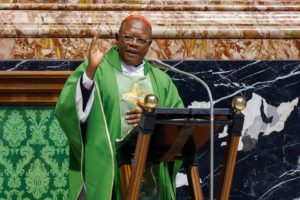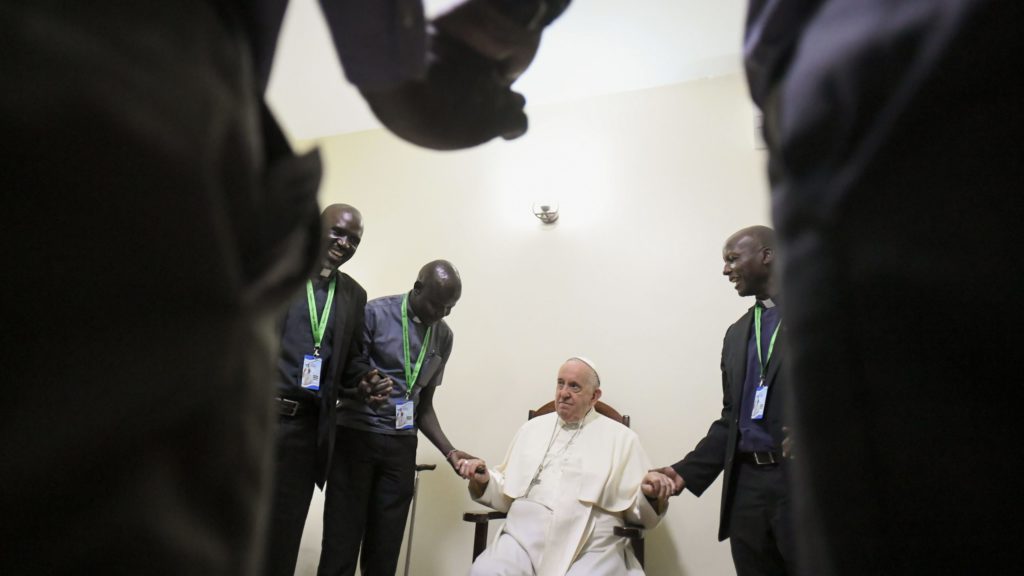ROME — In the abstract, one might have thought the stars were aligned in March 2013 for an era of good feelings between the new leader of Roman Catholicism, Pope Francis, and the church outside the Western sphere, perhaps especially in Africa.
After all, Francis is history’s first pope from the developing world, seeing himself as a tribune for the poor and excluded, including victims of both armed conflict and neocolonial exploitation. Africa probably is the continent on earth where those messages resonate the most deeply.
There certainly have been moments when that potential seemed realized, such as Francis’ dramatic January 2023 trip to the Democratic Republic of Congo, when he famously thundered, “Hands off Congo, hands off Africa! It is not a mine to be stripped, or a terrain to be plundered.”
Yet it’s unmistakable that in many ways, Africa has been as much a headache as a backstop for the Francis papacy over the past 11 years.
During the contentious 2014-2015 Synods of Bishops on the Family, for example, African prelates such as Cardinal Wilfrid Fox Napier were among the leading voices of skepticism about the idea of allowing divorced and remarried Catholics to receive Communion, often butting heads with progressive German bishops such as Cardinal Walter Kasper, who favored the proposal.
So strong was the contrast, in fact, that I suggested at the time a great book title on the two synods would be “The Rhine Flows into the Tiber … and Meets the Zambezi.”
Later on, Cardinal Robert Sarah of Guinea emerged as a leading conservative critic of several aspects of the Francis papacy, including mounting a spirited defense of clerical celibacy around the 2019 Synod on the Amazon where other bishops were proposing relaxing the requirement.
Most recently, of course, the bishops of Africa en masse have declared Fiducia Supplicans, the Vatican document authorizing blessings of couples in same-sex relationships, a dead letter on their continent.
There’s an ironic sense in which, despite being widely described as “Eurocentric,” Pope Benedict XVI actually generated more natural sympathy among many African prelates.
When much of Western Europe vilified Benedict in 2009 after he suggested that encouraging condom use might make the problem of HIV/AIDS worse, including an unprecedented formal censure from the Belgian parliament, I vividly recall several African prelates declaring that if Europe no longer wanted the pope, he’d be welcome among them.
The plain fact of the matter is that Francis is presiding over a theologically moderate-to-progressive papacy, at a time when the center of gravity among African prelates on most doctrinal questions, especially those most contentious under Francis, leans to the right.
Despite those tensions, both Pope Francis and the African church have powerful motives for finding a modus vivendi, because the raw truth is that they need one another.

On the African side of the equation, a contretemps in Congo involving Cardinal Fridolin Ambongo illustrates the point. The government under Congolese President Félix Tshisekedi has announced an investigation that could lead to Ambongo being charged with sedition for his sharp public criticism of the failures of the state to address chronic security challenges and injustices, especially in Congo’s contested eastern region.
Though the Vatican has yet to react publicly to the news, should charges against Ambongo actually be filed, Rome could use its diplomatic and political leverage to make a global cause célèbre of the situation, significantly increasing the pressure on Tshisekedi to back off.
Although Catholics are a majority in Congo, this global influence of the Vatican may be especially valuable to clergy in nations where Catholics are a small minority. In effect, being part of a vast global institution with a following of 1.3 billion and the status of a sovereign state means that you’re never alone, no matter how small your local following may be.
Wherever church leaders face hostile regimes or uncertain security environments, which is often the case in some parts of Africa, that knowledge that they have the institutional machinery of the Vatican at their backs is like a warm blanket at night.
On the Vatican’s side of the equation, they have equally compelling motives for keeping the relationship with Africa green, no matter what the occasional tensions may be in the Francis era.
To begin with, Africa today supplies an important share of the missionary personnel of the church in various parts of the world, with Europe and North America very much included. Indeed, in some parts of the West, if all the African priests and nuns currently serving there were to leave, whole dioceses would be effectively shuttered.
In our own small Roman parish, our pastor is an Italian but the associate pastor is from Cameroon, and other priests who help out on an occasional basis hail from Congo, Ivory Coast, and Nigeria. Without them, it’s unclear who, exactly, would keep the place afloat.
More basically, the Vatican needs Africa because it’s the zone of Catholicism’s greatest growth today, the spot on the map more than any other which contradicts the narrative of secularization and decline that haunts the church in most of the West.
During the last quarter of the 20th century, the Catholic population of sub-Saharan Africa exploded from 1.9 million to more than 130 million – a staggering growth rate of 6,708 percent. In many ways, Africa today is the motor that makes global Catholicism run, and popes know that as well as anyone else – probably better, in fact, than most.
As a result, African Catholicism and the Francis pontificate may have their issues, and the upcoming finale of the Synod of Bishops on synodality may once again put those fault lines on display. Yet a fundamental rupture does not seem in the forecast, for the simple reason that both parties to the relationship simply need one another too much.

